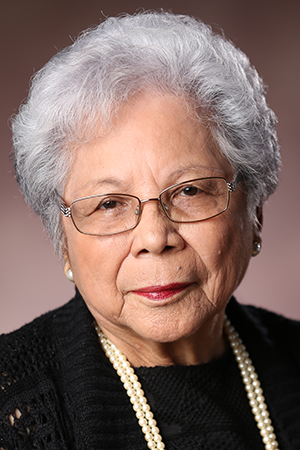Moved north to Machananao

Cleotilde Mendiola Bamba (1931 – ) was only 10 years old when the Japanese occupation of Guam began. Her family was forced to leave their house. Like most CHamorus on Guam during that period, the Mendiola family was displaced from their life in Hagåtña.
They didn’t give us time to pack our clothes or get any food. We had to go straight to my grandfather’s ranch out in Machananao, Yigo. Some of our friends there were able to help clothe us and feed us.
Cleotilde Mendiola Bamba
In Machananao, Bamba was deprived of much of her childhood.
We had to work for the Japanese. In the daytime the Japanese made us work in the field. You know in the boonies. I worked in Northwest Field with my sister-in-law, Cecilia Bamba, who was nine years old during that time. She’d carry the fosiños (CHamoru hoe) and I would carry the machete (large knife). We weren’t allowed to rest or eat until we get home to the ranch.
Being 10 for Bamba means something different compared to someone who has not experienced war. Ten years old for her meant becoming an adult and working and learning to survive.
Faith sustained her through much sorrow
As a devout Catholic, Bamba believed God would save her during the hardships of the occupation.
We prayed to Santa Marian Kamalen and all the saints. We asked them to help us. We prayed the rosary all the time and sang the traditional CHamoru songs like ‘Atan Jesus Kristo,’ ‘Korason Santos,’ and ‘Ave Maria.’ The only American song we sang in the war was ‘Uncle Sam’ but we couldn’t let the Japanese hear us sing that or they would hurt us.
During the war there was so much sorrow she was not able to fathom with her young eyes.
My mother, Maria Eustaquio Mendiola, was carrying my newborn brother while my brother, Ralph, who was seven years old was holding onto her skirt. A Japanese swung a bayonet to my mother’s neck to cut her, but it didn’t kill her. Her blood splattered onto Ralph.
The haunting image of her brother being covered in their mother’s blood is something she will never forget. Perhaps there is really no reason behind the soldier striking her mother other than to scar a beautiful CHamoru woman.
What truly breaks her heart when thinking of Ralph, though, is her last memory of him, malnourished and pale. He was just a body and not a little boy. Her father, Juan Mendiola, carried the dying Ralph throughout the forced march to Manenggon. Juan would not let go of his son until the Americans came and pronounced him dead.
During the march Bamba was too exhausted, both mentally and physically to cry for Ralph. She had been more concerned with her five-year-old brother, Jose, who made her carry him.
He was crying about blisters on his feet from the rocks. Jose rode on my back in the march.
After the war, the Mendiolas were able to return to their family home.
Our house was a two-story house in Agana Heights. The bottom floor was concrete but the second floor was wood and tin. When the American truck let us down the hill we were so happy to see that our house didn’t get burned down because it was camouflaged with the big banana leaves.
Love for baking survived
Bamba watched her mother return to a passion she had to put aside because of the war.
My mom loved to bake. She wasn’t able to bake during the war because the Japanese would take the food. Her family, the Eustaquios, is a family of bakers. It is a skill passed down from my great-grandfather. Our love for baking is still passed down to our grandchildren.
The US Marines really helped Maria rekindle her passion for baking after the war.
The Marines built my family two huge Dutch ovens that could be filled with 200 loaves of bread. And they gave her all the ingredients so she can start again. She would make half for the Marines and half for our family to sell. And sometimes she would give bread to sick people. They really helped her start to bake again. My mom made all her pastries with her hands; she didn’t need machines. I used to bake a lot when my husband, Fredrick, was alive, but he died in 1982.
Her husband, Frederick Bamba, was a musician and also a CHamoru war survivor. The two overcame their trauma with their love of music and dancing. The couple loved to chacha and boogie at Joe and Flo’s in Asan. The late musician’s legacy is alive in his children because he taught them how to play instruments.
Something Bamba wants CHamorus to get from her story is to pray for peace.
People should pray for no more wars in Guam or just anywhere in the world.
Editor’s note: Reprinted and adapted, with permission, from Guam War Survivors Memorial Foundation by Johanna Salinas.
